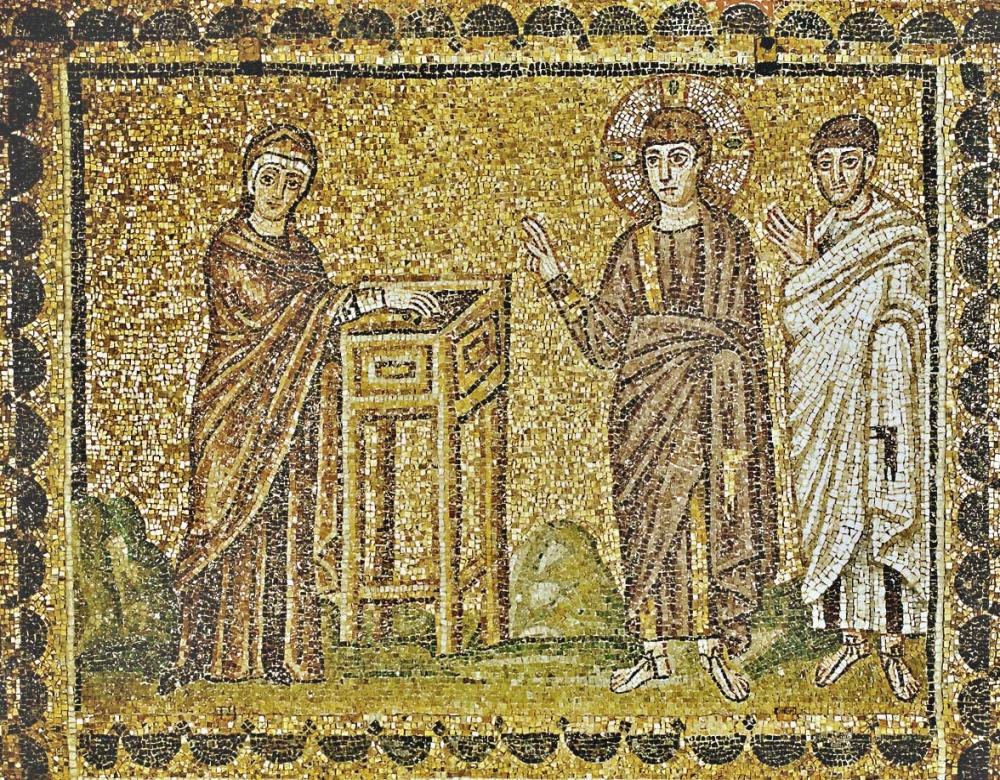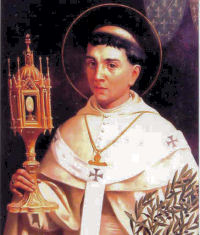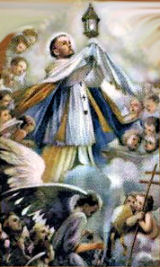June 6, 2015
Saturday of the Ninth Week in Ordinary Time
Tobit called his son Tobiah and said to him,
“Son, see to it that you give what is due to the man
who made the journey with you; give him a bonus too.”
So he called Raphael and said,
“Take as your wages half of all that you have brought back,
and go in peace.”
Raphael called the two men aside privately and said to them:
“Thank God! Give him the praise and the glory.
Before all the living,
acknowledge the many good things he has done for you,
by blessing and extolling his name in song.
Honor and proclaim God’s deeds,
and do not be slack in praising him.
A king’s secret it is prudent to keep,
but the works of God are to be declared and made known.
Praise them with due honor.
Do good, and evil will not find its way to you.
Prayer and fasting are good,
but better than either is almsgiving accompanied by righteousness.
A little with righteousness is better than abundance with wickedness.
It is better to give alms than to store up gold;
for almsgiving saves one from death and expiates every sin.
Those who regularly give alms shall enjoy a full life;
but those habitually guilty of sin are their own worst enemies.
“I will now tell you the whole truth;
I will conceal nothing at all from you.
I have already said to you,
‘A king’s secret it is prudent to keep,
but the works of God are to be made known with due honor.’
I can now tell you that when you, Tobit, and Sarah prayed,
it was I who presented and read the record of your prayer
before the Glory of the Lord;
and I did the same thing when you used to bury the dead.
When you did not hesitate to get up
and leave your dinner in order to go and bury the dead,
I was sent to put you to the test.
At the same time, however,
God commissioned me to heal you and your daughter-in-law Sarah.
I am Raphael, one of the seven angels
who enter and serve before the Glory of the Lord.”
“So now get up from the ground and praise God.
Behold, I am about to ascend to him who sent me;
write down all these things that have happened to you.”
R. (1b) Blessed be God, who lives for ever.
He scourges and then has mercy;
he casts down to the depths of the nether world,
and he brings up from the great abyss.
No one can escape his hand.
R. Blessed be God, who lives for ever.
So now consider what he has done for you,
and praise him with full voice.
Bless the Lord of righteousness,
and exalt the King of ages.
R. Blessed be God, who lives for ever.
In the land of my exile I praise him
and show his power and majesty to a sinful nation.
R. Blessed be God, who lives for ever.
Bless the Lord, all you his chosen ones,
and may all of you praise his majesty.
Celebrate days of gladness, and give him praise.
R. Blessed be God, who lives for ever.
R. Alleluia, alleluia.
Blessed are the poor in spirit;
for theirs is the Kingdom of heaven.
R. Alleluia, alleluia.
In the course of his teaching Jesus said,
“Beware of the scribes, who like to go around in long robes
and accept greetings in the marketplaces,
seats of honor in synagogues,
and places of honor at banquets.
They devour the houses of widows and, as a pretext,
recite lengthy prayers.
They will receive a very severe condemnation.”
He sat down opposite the treasury
and observed how the crowd put money into the treasury.
Many rich people put in large sums.
A poor widow also came and put in two small coins worth a few cents.
Calling his disciples to himself, he said to them,
“Amen, I say to you, this poor widow put in more
than all the other contributors to the treasury.
For they have all contributed from their surplus wealth,
but she, from her poverty, has contributed all she had,
her whole livelihood.”
Saint Norbert, Bishop
Saint Norbert, Bishop
Optional Memorial
June 6th

Saint Norbert
Marten Pepijn
1637
Oil on panel
O.-L. Vrouwekathedraal, Antwerp
Saint Norbert was born in Xanten, in what is now Germany, he turned from a worldly life, became a monk and an itinerant preacher, and later founded the Premonstratensians. Through his example and preaching, he worked very hard to implant the religious and moral reforms of Pope Gregory VII. He died Archbishop of Magdeburg.
Source: Daily Roman Missal, Edited by Rev. James Socías, Midwest Theological Forum, Chicago, Illinois ©2003
Collect:
Father,
O God, who made the Bishop Saint Norbert
a servant of your Church
outstanding in his prayer and pastoral zeal,
grant, we ask, that by the help of his intercession,
the flock of the faithful
may always find shepherds after your own heart
and be fed in the pastures of salvation.
Through our Lord Jesus Christ, your Son,
who lives and reigns with you in the unity of the Holy Spirit,
one God, for ever and ever. +Amen.
First Reading: Ezekiel 34:11-16
"For thus says the Lord God: Behold, I, I Myself will search for My sheep, and will seek them out. As a shepherd seeks out his flock when some of his sheep have been scattered abroad, so will I seek out My sheep; and I will rescue them from all places where they have been scattered on a day of clouds and thick darkness. And I will bring them out from the peoples, and gather them from the countries, and will bring them into their own land; and I will feed them on the mountains of Israel, by the fountains, and in all the inhabited places of the country. I will feed them with good pasture, and upon the mountain heights of Israel shall be their pasture; there they shall lie down in good grazing land, and on fat pasture they shall feed on the mountains of Israel. I Myself will be the shepherd of My sheep, and I will make them lie down, says the Lord God. I will seek the lost, and I will bring back the strayed, and I will bind up the crippled, and I will strengthen the weak, and the fat and the strong I will watch over; I will feed them in justice.
Gospel Reading: Luke 14:25-33
Now great multitudes accompanied Him; and He turned and said to them, "If any one comes to me and does not hate his own father and mother and wife and children and brothers and sisters, yes, and even his own life, he cannot be My disciple. Whoever does not bear his own cross and come after Me, cannot be My disciple. For which of you, desiring to build a tower, does not first sit down and count the cost, whether he has enough to complete it? Otherwise, when he has laid a foundation, and is not able to finish, all who see it begin to mock him, saying, 'This man began to build, and was not able to finish.' Or what king, going to encounter another king in war, will not sit down first and take counsel whether he is able with ten thousand to meet him who comes against him with twenty thousand? And if not, while the other is yet a great way off, he sends an embassy and asks terms of peace. So therefore, whoever of you does not renounce all that he has cannot be My disciple".
38. And he said to them in his doctrine, Beware of the Scribes, which love to go in long clothing, and love salutations in the marketplaces,
39. And the chief seats in the Synagogues, and the uppermost rooms at feasts:
40. Which devour widows' houses, and for a pretense make long prayers: these shall receive greater damnation.
PSEUDO-JEROME; After confuting the Scribes and Pharisees, He burns up as a fire their dry and withered examples; wherefore it is said, And he said to them in his doctrine, Beware of the Scribes, which love to go in long clothing.
BEDE; To walk in long clothing is to go forth into public clad in garments too much ornamented, in which amongst other things, that rich man, who fared sumptuously every day, is said to have sinned.
THEOPHYL. But they used to walk in honorable garments because they wished to be highly esteemed for it, and in like manner they desired other things, which lead to glory. For it goes on: And love salutations in the marketplaces, and the chief seats in the synagogues, and the uppermost rooms at feasts.
BEDE; We must observe that He does not forbid that those, to whom it falls by the rule of their office, should be saluted in the marketplace, or have chief seats and places at feasts, but He teaches that those who hove those things unduly, whether they have them or no, are to be avoided by the faithful as wicked men: that is, He blames the intention and not the office; although this too is culpable, that the very men who wish to be called masters of the synagogue in Moses' seat, should have to do with lawsuits in the marketplace. We are in two ways ordered to beware of those who are desirous of vain glory; first, we should not be seduced by their hypocrisy into thinking that what they do is good; nor secondly, should we be excited to imitate them, through a vain rejoicing in being praised for those virtues which they affect.
THEOPHYL. He also especially teaches the Apostles, not to have any communication with the scribes, but to imitate Christ Himself; and in ordaining them to be masters in the duties of life, He places others under them.
BEDE; But they do not only seek for praise from men, but also for gain. Wherefore there follows, Which devour widows' houses, under the pretense of long prayers. For there are men who pretending to be just hesitate not to receive money from persons who are troubled in conscience, as though they would be their advocates in the judgment. A hand stretched out to the poor is always an accompaniment to prayer, but these men pass the night in prayer, that they may take away money from the poor.
THEOPHYL. But the Scribes used to come to women, who were left without the protection of their husbands, as though they were their protectors; and by a pretense of prayer, a reverend exterior and hypocrisy, they used to deceive widows, and thus also devour the houses of the rich. it goes on, These shall receive a greater damnation, that is, than the other Jews, who sinned.
41. And Jesus sat over against the treasury, and beheld how the people cast money into the treasury: and many that were rich cast in much.
42. And there came a certain poor widow, and she threw in two mites, which make a farthing.
43. And he called to him his disciples, and said to them, Verily I say to you, That this poor widow has cast more in, than all they which have cast into the treasury:
44. For all they did cast in of their abundance; but she of her want did cast in all that she had, even all her living.
BEDE; The Lord, who had warned them to avoid the desire of high place and vain glory, now distinguishes by a sure test those who brought in gifts. Wherefore it is said, And Jesus sat over against the treasury, and beheld how the people cast money into the treasury. In the Greek language, phylassein means to keep, and gaza is a Persian word for treasure; wherefore the word gazophylacium which is here used means a place where riches are kept, which name also was applied to the chest in which the offerings of the people were collected, for the necessary uses of the temple, and to the porch in which they were kept. You have a notice of the porch in the Gospel, These words spoke Jesus in the treasury as He taught in the temple; and of the chest in the book of Kings, But Jehoida the priest took a chest.
THEOPHYL. Now there was a praiseworthy custom amongst the Jews, that those who were able and willing should put something into the treasury, for the maintenance of the priests, the poor, and the widows; wherefore there is added, And many that were rich cast in much. But whilst many people were so engaged, a poor widow came up, and showed her love by offering money according to her ability; wherefore it is said, And there came a certain poor widow, and she threw in two mites, which make a farthing
BEDE; Reckoners use the word 'quadrans' for the fourth part of anything, be it place, money, or time. Perhaps then in this place is meant the fourth part of a shekel, that is, five pence. It goes on, And he called to him his disciples, and said to them, Verily I say to you, That this poor widow has cast more in, than all they which have cast into the treasury: for God does not weigh the property but the conscience of those who offer; nor did He consider the smallness of the sum in her offering, but what was the store from which it came.
Wherefore He adds, For all they did cast in of their abundance, but she of her want did cast in all that she had, even all her living.
PSEUDO-JEROME; But in a mystical sense, they are rich, who bring forth from the treasure of their heart things new and old, which are the obscure and hidden things of Divine wisdom in both testaments; but who is the poor woman, if it be not I and those like me, who cast in what I can, and have the will to explain to you, where I have not the power. For God does not consider how much you hear, but what is the store from which it comes; but each at all events can bring his farthing, that is, a ready will, which is called a farthing, because it is accompanied by three things, that is, thought, word, and deed. And in that it is said that she cast in all her living, it is implied that all that the body wants is that by which it lives; wherefore it is said, All the labor of man is for his mouth.
THEOPHYL. Or else; That widow is the soul of man, which leaving Satan to which it had been joined, casts into the temple two mites, that is, the flesh and the mind, the flesh by abstinence, the mind by humility, that so it may be able to hear that it has cast away all its living, and has consecrated it, leaving nothing for the world of all that it possessed.
BEDE; Again, in an allegorical way, the rich men, who cast gifts into the treasury, point out the Jews puffed up with the righteousness of the law; the poor widow is the simplicity of the Church: poor indeed, because she has cast away the spirit of pride and of the desires of worldly things; and a widow, because Jesus her husband has suffered death for her. She casts two mites into the treasury, because she brings the love of God and of her neighbor, or the gifts of faith and prayer; which are looked upon as mites in their own insignificance, but measured by the merit of a devout intention are superior to all the proud works of the Jews. The Jew sends of his abundance into the treasury, because he presumes on his own righteousness; but the Church sends her whole living into God's treasury, because she understands that even her very living is not of her own desert, but of Divine grace.
Catena Aurea Mark 12
Catholic Spiritual Direction.com
Grace (Like in Sap)
June 6, 2015 by Joseph Hollcraft
I still remember the opening tune to the popular Saturday morning show Land of the Lost. My favorite subject matter in grade school was the dinosaur age. I would often pass the time as a kid playing with my

little dinosaur figurines. We had a pond in our backyard with tadpoles, and I used to have the inanimate dinosaurs battle the live tadpoles in a game of surrender (the dinosaurs usually won). Imagine my excitement when, as a junior in high school, I saw the trailer for a movie that would bring the extinct creatures that preoccupied my childhood back to life.
After my initial excitement of seeing dinosaurs on the big screen waned, I had a lingering question in my mind: how would they bring the dinosaurs to life? The movie wasted no time in answering that question. Mosquitoes bit

dinosaurs, then flew and landed on sap trees. The tree sap encased the mosquitoes and the dinosaur blood within them. Archaeologists found the fossilized mosquitoes, extracted the dinosaur DNA, mixed it with frog DNA to fill in the genetic gaps, and bingo–“Dino DNA” (Jurassic Park).
After watching the movie a handful of times, I found myself almost as fascinated with sap as I was with dinosaurs. I even recall going to a library and reading up on sap before research was so immediate on the Internet.
Later in college, the image of sap again grabbed my attention. One of my Dominican professors correlated sap with grace. He said, “The gifts we receive at baptism are like sap.” He continued, “Grace itself contains within it this idea of a sticky like substance.” In other words, grace, unmerited, sticks to our soul. This Dominican professor offered up for me a palpable image to better understand grace.
I left the classroom that day mindful of another truth as it relates to sap and grace.
Sap contains within it, nutrients, water, and even hormones. Sap, then, carries within it, life-giving properties and the identity of its source–the tree. Even more so, grace carries within its substance life-giving properties and the identity of its source–God’s love. It is to say, the grace that envelops us in the life of the Church is the very life-giving substance that is the love of God. In grace, we receive God’s spiritual DNA.
This life-giving substance protrudes from God and the life of the Church in two forms:
* Sanctifying Grace: This grace, which is a gift from God, truly makes us holy—like God—we truly share in His very life.
* Actual Grace: This grace helps us to become like God in specific circumstances in our life. As all grace, it is the free and undeserved help that God gives us to respond fully to His call (For a further distinction between these wonderful gifts of God to us, see the Catechism of the Catholic Church [CCC], paragraphs 1996-2001).

We are to draw from the nutrients of grace in a life of constant prayer that we might bear its fruit—joy! The word for joy, chara, is derived from the same Greek root that belongs to grace, charis. Joy is the fragrance of God’s very substance of grace. To tease out further, the word enthusiasm comes from the Greek en-theos, “that bears a god within”. Enthusiastic joy is not some self-created happiness, but the sweet fragrance of God bursting forth.
We are to submerge ourselves in God’s grace (like in sap), allowing it to nourish us and give us life, bring us joy, and effect all that we touch in our journey of faith.






 Although a cleric, Norbert led a very worldly life for a number of years. The decisive change took place suddenly in 1115. While riding one day, he was overtaken by a thunderstorm. A flash of lightning struck the ground before him, the horse threw him, and he seemed to hear a voice upbraiding him for his conduct.
Although a cleric, Norbert led a very worldly life for a number of years. The decisive change took place suddenly in 1115. While riding one day, he was overtaken by a thunderstorm. A flash of lightning struck the ground before him, the horse threw him, and he seemed to hear a voice upbraiding him for his conduct.